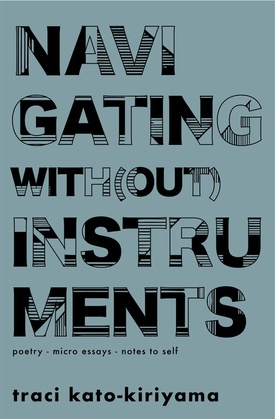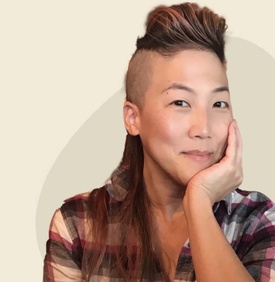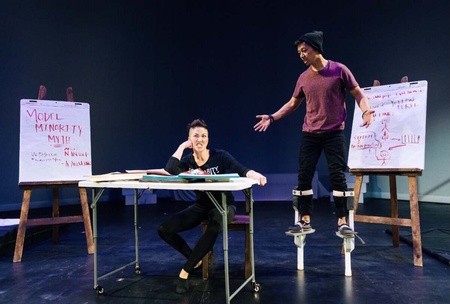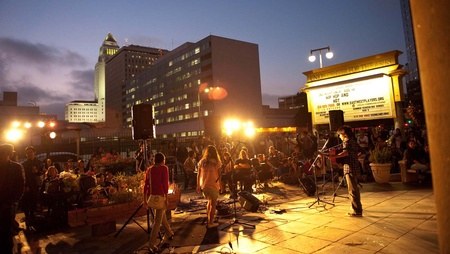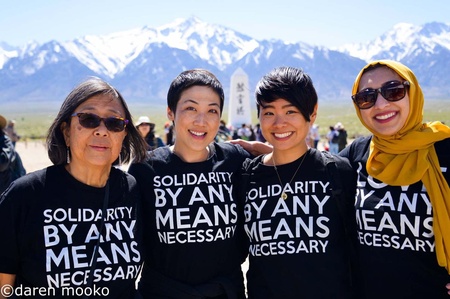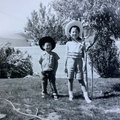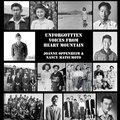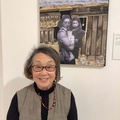traci is a queer, third/fourth generation Nikkei writer and performer. She said, “One of the questions I asked myself was what kind of conversations do I want to have with this book? What kinds of groups do I want to interact with and speak with?” Navigating is a brutally honest collection of traci’s writings which explore topics such as death, cancer, assault, and family losses. But it also explores joy, love, hope, and healing.
She explained, “I wanted first and foremost for it to be present and honest with the memories and stories and issues that were either top-of-mind in my surrounding kind of life, in my context. Or things that I’ve been holding onto for a really long time. I wanted to kind of dive into all of those. And at the same time, I wanted to make space for some humor and definitely expressions of love.”
“But I wanted the whole collection to feel like a substantial slice of my life; and a substantial moment of, a substantial time of reckoning and grappling with various memories, and history and current issues, too, you know? Yeah, I think that’s the whole idea of opening up and pouring myself into this project.”
The first poem is called remember, all the children whom were never born to me. The subject has surprised some of her readers. She put this poem at the beginning because, as traci explained, “I think I didn’t want this to get buried somewhere else in the book as an afterthought.”
She continued, “I had these dreams and I’d wake up and they were so striking. So I did want to just write about them. I wanted to document for myself these beautiful little people that I imagined. And it was a way for me to talk about what it means to be a so-called not-a-parent.”
Pieces not found in any other writing collection are “Navigation Tips” or “Notes to Self (N.T.S.),” which are meant to be an honest communication to self, not a means to explain each piece. There are a variety of notes, including “Note to Community (N.T.C.),” “Note to World (N.T.W.),” and many others. Each book section is preceded by an icon. The icons are from U.S. Army, Navy and Air Force survival manuals, dated from 1941-1957. There is also a warning: “a book of poetry is a trigger warning.”
The writing process took eight years, so long that people stopped asking when the book would come out. That period included traci’s battle with cancer in 2016, which she wrote about. The poem “Week after Diagnosis – day 9,” has wry humor. The answer to the question, “Are you cancer-free?” is “Contemplate 102-year plan.” Bachan, her dad’s mother, lived to be 102. Until she was diagnosed with cancer, traci had never doubted whether she could make it to 102.
“There never was a time that I was close to giving up on it (the book). But it was very stressful and it was always on the back of my mind even when I wasn’t working on it. When it was finally released, the first feeling I had before excitement was relief.”
Artistic and Community Activism
traci is a performer and principal writer for the PULLproject Ensemble, where she has performed with aerial artist Kennedy Kabasares since 2008. The idea for Tales of Clamor originally began as a two-person performance with Kabasares on the trapeze and traci on the stage. In 2015 they developed a play in collaboration with Nikkei for Civil Rights & Redress (NCRR) and Visual Communications. The play explored the story of Japanese Americans after incarceration and included archival footage from the 1981 Commission on Wartime Relocation and Internment of Civilians (CWRIC) hearings.
From February to March 2019, they did nineteen shows of Tales of Clamor with a seven-person cast at the Aratani Theatre in Little Tokyo. Recently PULLproject was a finalist in the 2021-2022 National Theater Project (NTP) Creation and Touring grant. The first 2023 Tales of Clamor performance is April 30 at USC Bing Theatre for Visions and Voices. traci is lining up additional performances for 2023-2024. She is hoping to take the production to Chicago, Seattle, or the Bay Area.
Japanese American activist Kathy Masaoka said, “When traci was a student at CSU Fullerton, she saw the CWRIC testimonies for the first time and it changed her life. It changed NCRR and the community, too, because she held these stories close to her heart. When NCRR asked her (which was often) to help with a Day of Remembrance program, she brought the voices of the Issei and Nisei back to teach lessons about breaking silence today and in a magical production called Tales of Clamor. She calls us her mentors, we call her a bridge builder, a connector of communities, a truth teller activist and our lil’ sis.”
traci fondly calls Kathy her “Sansei BFF.” Together they advocate for black reparations and the passage of HR40 through their work in Nikkei Progressives.
In the poem “The Invisible Capes of Little Tokyo,”she observes people in cosplay costumes and wonders if there are other superheroes with invisible capes. She sees “Nisei volunteers walking back to the museum with seed packets from Anzen Hardware” or others “Armed with staff & sword in the form of plastic file carriers from Daiso.” This poem pays homage to traci’s community heroes and to Little Tokyo.
traci is director and co-founder of Tuesday Night Project, which produces the popular Tuesday Night Cafe (TNC) in Little Tokyo. TNC is one of the longest-running free arts and performance series in downtown Los Angeles. Founded in 1998, it is the oldest currently running Asian American open mic space in the country. TNC features new original work from the Asian American/Pacific Islander communities. It has been on hiatus since the pandemic, but resumed April 4.
She is a core artist of the grassroots organization, Vigilant Love. The organization began as a coalition that came together after the 2015 San Bernardino shooting as a rapid response to the wave of Islamophobic backlash. It built upon the relationships already developed between Muslim Americans and Japanese Americans after 9/11.
Vigilant Love produces an annual event and fundraiser called the Bridging Communities Iftar. Iftar is the meal eaten by Muslims after sunset during Ramadan, when they “break the fast.” During the pandemic, the Bridging Communities Iftar was on zoom. This year Bridging Communities will hold the first in-person celebration since the pandemic. Adapted from Iftar, this year’s April 23 event is called “The Bridging Communities Eid Celebration, Sweets & Solidarity.” In Arabic, Eid means a feast, festival, or holiday.
The book has allowed traci to have amazing conversations with all kinds of people from all walks of life, all ages, different communities, identities and experiences, as well as spiritual and religious paths. She said, “I want to connect with folks.” She had a book discussion with a UCLA class of about a hundred students last year.
She admitted, “I understand I am taking a risk. But I do believe it really does serve a greater purpose than just expression. It’s what I’m trying to communicate with the world. It’s what I’m trying to process within myself. Some of it is not just excavation of history. Some of it is excavating things out of my own marrow, out of my own bones.”
© 2023 Edna Horiuchi


